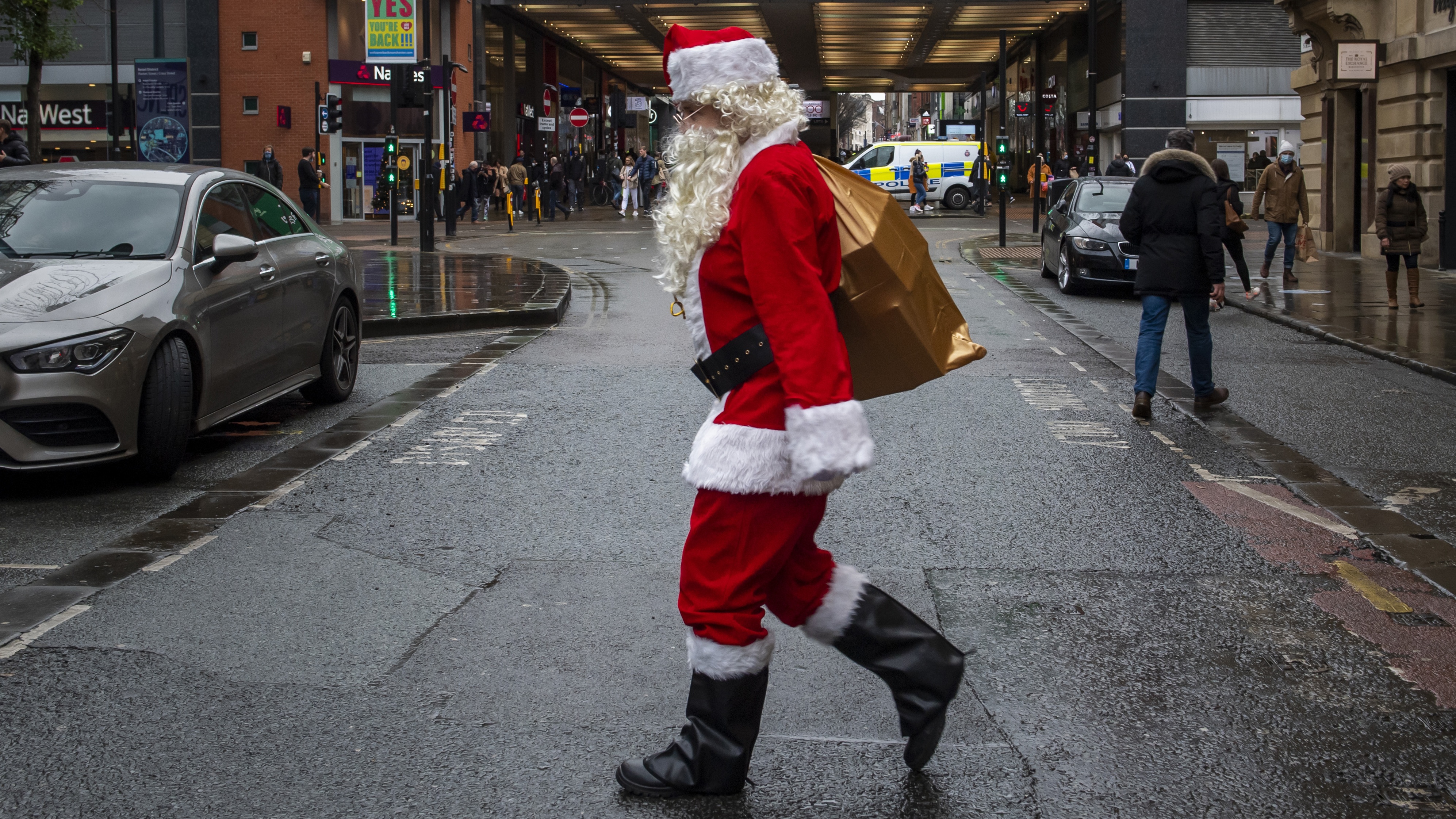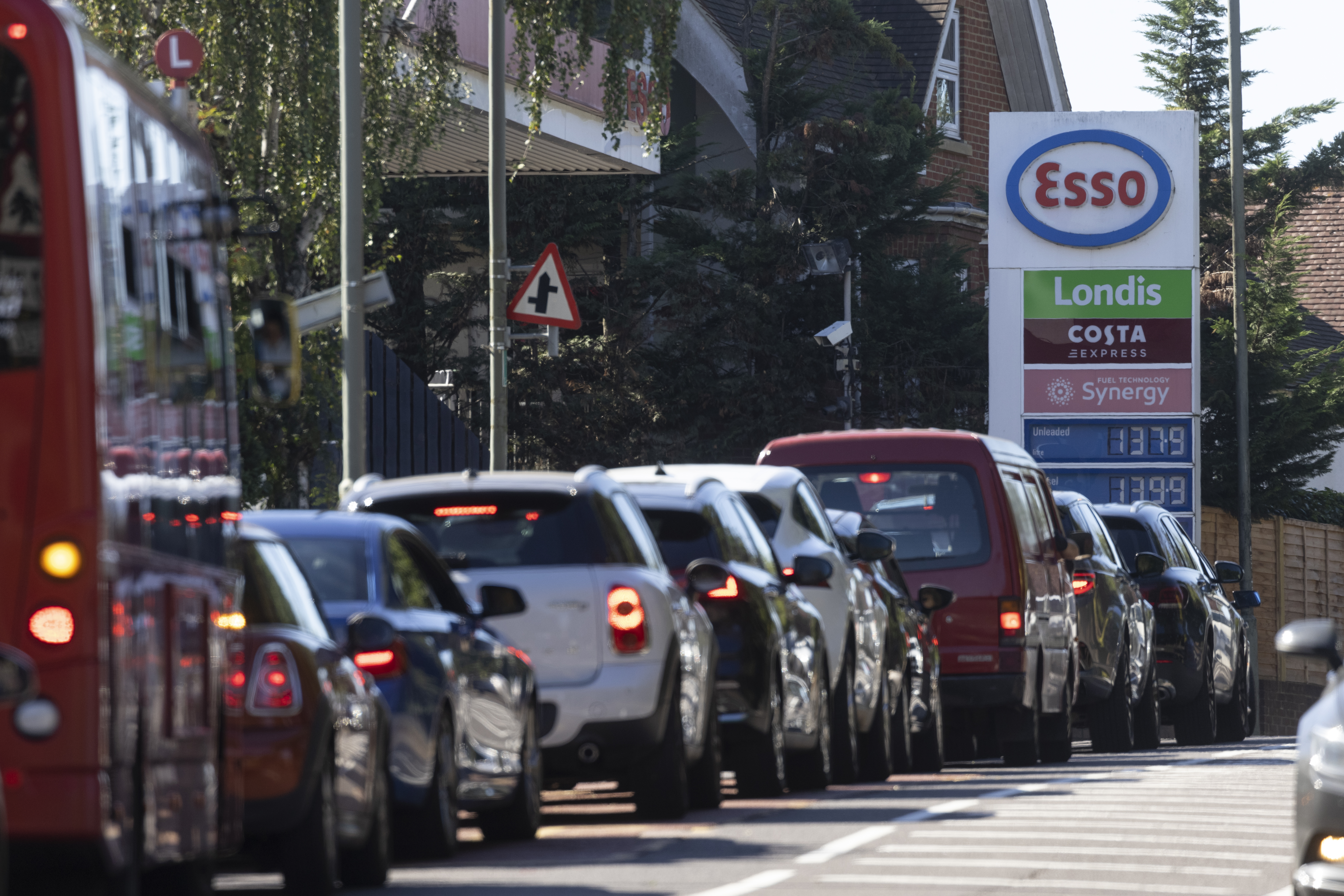Who is to blame for the UK’s looming Christmas crisis?
Brexit and Covid-19 among explanations as festive supply chain blame game begins

A free daily email with the biggest news stories of the day – and the best features from TheWeek.com
You are now subscribed
Your newsletter sign-up was successful
Delays at the UK’s biggest container port are threatening to derail Christmas for a second consecutive year as retailers struggle to bring festive favourites into the country.
Images of empty shelves have flooded social media and frozen turkeys are selling out at many supermarkets as consumers start stockpiling, amid a steady flow of alarming headlines.
Several British retailers have warned of potential product shortages during the Christmas shopping season as a result of worsening supply chain problems. So who – or what – is to blame for the looming festive crisis?
The Week
Escape your echo chamber. Get the facts behind the news, plus analysis from multiple perspectives.

Sign up for The Week's Free Newsletters
From our morning news briefing to a weekly Good News Newsletter, get the best of The Week delivered directly to your inbox.
From our morning news briefing to a weekly Good News Newsletter, get the best of The Week delivered directly to your inbox.
Many in the industries impacted by supply issues have pointed the finger of blame at Brexit.
Britain’s exit from the EU has left “British workers filling the gaps left in the haulage industry, warehousing, hospitality and the meat production sectors”, The Guardian said. And new administrative issues caused by the departure from the EU have also been blamed.
Tasneem Alonzo, MD of herb and spice firm EHL Ingredients, told Business Live that “extended lead times” are being caused by “additional paperwork and customs clearance”, adding that ”extra duty charges are being applied on goods that were not there before”.
A free daily email with the biggest news stories of the day – and the best features from TheWeek.com
While there are “global issues” with supply chains due to the pandemic, “they are being exacerbated by Brexit here in the UK”, she added.
French Finance Minister Bruno Le Maire has blamed the UK’s supply shortage on the decision to leave the EU single market.
“We are facing the same situation,” he told the BBC during a gathering of the G7 finance ministers in Washington. “But the fact that we are a member of a very important single market helps us facing these bottlenecks.”
Politico agreed that the decision to leave the EU has a part to play in the ongoing crisis, saying that it “compounded existing labour shortages by imposing tough visa requirements on foreign workers after Brexit – just when they were most needed”.
Covid-19
This is the explanation favoured by government ministers, with Transport Secretary Grant Shapps telling Sky News that the pandemic was the “main reason” for worker shortages and supply issues.
“We shouldn’t report ourselves into a crisis” over dwindling supplies, Shapps continued, adding: “We know that the globe has woken up after coronavirus with huge supply chain issues everywhere around the entire world.”
According to the Institute for Government, the pandemic has also “played a role in driving staff shortages” as “many EU nationals working in the UK before the end of the Brexit transition period” decided “to move back to their home countries”.
It has also meant that “the haulage sector has been left vulnerable as the pandemic disrupted new driver training”, the think tank said, adding that “during the first year of the crisis, the DVLA suspended many vocational driving tests, resulting in a loss of 30,000 test slots”.
The government
Keir Starmer has said that the chaos is a result of the government’s “total lack of planning” for how to respond to the end of the Brexit transition period.
The Labour leader told the BBC’s Andrew Marr Show that “when we exited the EU, one consequence was there was going to be a shortage of HGV drivers”, describing the events we are now seeing as “predictable”.
“We took the decision to leave the EU in 2016, so we’ve had five years for the government to work through the consequences”, he added, accusing Johnson of “taking the British people for fools” over the government’s excuses.
Johnson has denied responsibility, however, telling business leaders that it is not the government’s job to “fix” supply problems, The Independent said.

The unions
According to The Guardian, “almost £1.5bn of goods being imported into the UK will be hit by shipping delays in the run-up to Christmas if the backlog at Felixstowe continues until the festive season”.
The UK’s biggest container port has been brought to near deadlock by delays. Maersk, the world’s largest container-shipping company, is currently diverting container ships away from Felixstowe because it is “rammed full of containers”, the Financial Times said.
And The Telegraph said that gridlock could be exacerbated as the shortage of HGV drivers is “set to get worse”.
Members of the Public and Commercial Services union are preparing to vote on strike action “over fears that 2,500 staff working in its offices are at risk of Covid” at the Driver and Vehicle Licensing Agency (DVLA), the paper added.
The Road Haulage Association has warned that any industrial action “could not come at a worse time” and will exacerbate the driver shortage that has led to empty supermarket shelves and a fuel crisis.
The media
Large sections of the public have blamed the media for elements of the supply crisis. A YouGov poll of 3,361 Brits found that 47% of people think the media is “most to blame for petrol stations running out of fuel”.
Professor Karin Wahl-Jorgensen, from Cardiff University, told ITV that she did not think the fuel crisis was “fabricated by the media”, however, as “the crisis was there for people to see”.

The public
Some have blamed the general public’s panic buying for deepening the crisis, while social media posts have also been blamed for aggravating the fuel shortages.
Brian Madderson, chairman of the Petrol Retailers Association, told BBC Radio 4’s Today programme that “as soon as a tanker arrives at a filling station, people on social media are advising that a tanker has arrived and then it is like bees to a honey pot”.
“Everyone flocks there and… within a few hours it is out again,” he added, warning that “it is panic buying when you go to fill up your car to the entirety of its tank capacity which you wouldn’t normally do”.
During the panic buying of toilet paper at the start of the pandemic, Dr Cathrine Jansson-Boyd, a consumer psychologist at Anglia Ruskin University, told the BBC that there is “a snowball effect as consumers observed each other stockpiling – they also had to do it”.
And there could be a repeat of this phenomena in the run-up to Christmas.
According to The Sun, shoppers are already “panic-buying Christmas toys and presents”, with “high streets, shopping centres and retail parks” all seeing an increase in footfall “over the past week as people hit stores to fill trolleys with toys and games”.
Professor Joshua Bamfield, director of the Centre for Retail Research, told the paper: “Parents don’t want to take chances on products not being available near to Christmas, so some are buying now. If people expect a crisis, they help create one by rushing to shops to buy things.”
The issue is also being exacerbated because “the global economy at the start of the year bounced back far more strongly than many economists or businesses had anticipated”, The Times said.
Consumers flush with pandemic savings are “splashing out on everything from electronics to exercise bikes and toys”, the paper added. And the “pandemic-disrupted supply of everything from vital components to lorry drivers to containers is struggling to keep up with demand”.
Chas Newkey-Burden has been part of The Week Digital team for more than a decade and a journalist for 25 years, starting out on the irreverent football weekly 90 Minutes, before moving to lifestyle magazines Loaded and Attitude. He was a columnist for The Big Issue and landed a world exclusive with David Beckham that became the weekly magazine’s bestselling issue. He now writes regularly for The Guardian, The Telegraph, The Independent, Metro, FourFourTwo and the i new site. He is also the author of a number of non-fiction books.
-
 Is Andrew’s arrest the end for the monarchy?
Is Andrew’s arrest the end for the monarchy?Today's Big Question The King has distanced the Royal Family from his disgraced brother but a ‘fit of revolutionary disgust’ could still wipe them out
-
 Quiz of The Week: 14 – 20 February
Quiz of The Week: 14 – 20 FebruaryQuiz Have you been paying attention to The Week’s news?
-
 The Week Unwrapped: Do the Freemasons have too much sway in the police force?
The Week Unwrapped: Do the Freemasons have too much sway in the police force?Podcast Plus, what does the growing popularity of prediction markets mean for the future? And why are UK film and TV workers struggling?
-
 How are Democrats turning DOJ lemons into partisan lemonade?
How are Democrats turning DOJ lemons into partisan lemonade?TODAY’S BIG QUESTION As the Trump administration continues to try — and fail — at indicting its political enemies, Democratic lawmakers have begun seizing the moment for themselves
-
 How corrupt is the UK?
How corrupt is the UK?The Explainer Decline in standards ‘risks becoming a defining feature of our political culture’ as Britain falls to lowest ever score on global index
-
 How did ‘wine moms’ become the face of anti-ICE protests?
How did ‘wine moms’ become the face of anti-ICE protests?Today’s Big Question Women lead the resistance to Trump’s deportations
-
 How are Democrats trying to reform ICE?
How are Democrats trying to reform ICE?Today’s Big Question Democratic leadership has put forth several demands for the agency
-
 Why is Tulsi Gabbard trying to relitigate the 2020 election now?
Why is Tulsi Gabbard trying to relitigate the 2020 election now?Today's Big Question Trump has never conceded his loss that year
-
 Will Democrats impeach Kristi Noem?
Will Democrats impeach Kristi Noem?Today’s Big Question Centrists, lefty activists also debate abolishing ICE
-
 The high street: Britain’s next political battleground?
The high street: Britain’s next political battleground?In the Spotlight Mass closure of shops and influx of organised crime are fuelling voter anger, and offer an opening for Reform UK
-
 Do oil companies really want to invest in Venezuela?
Do oil companies really want to invest in Venezuela?Today’s Big Question Trump claims control over crude reserves, but challenges loom